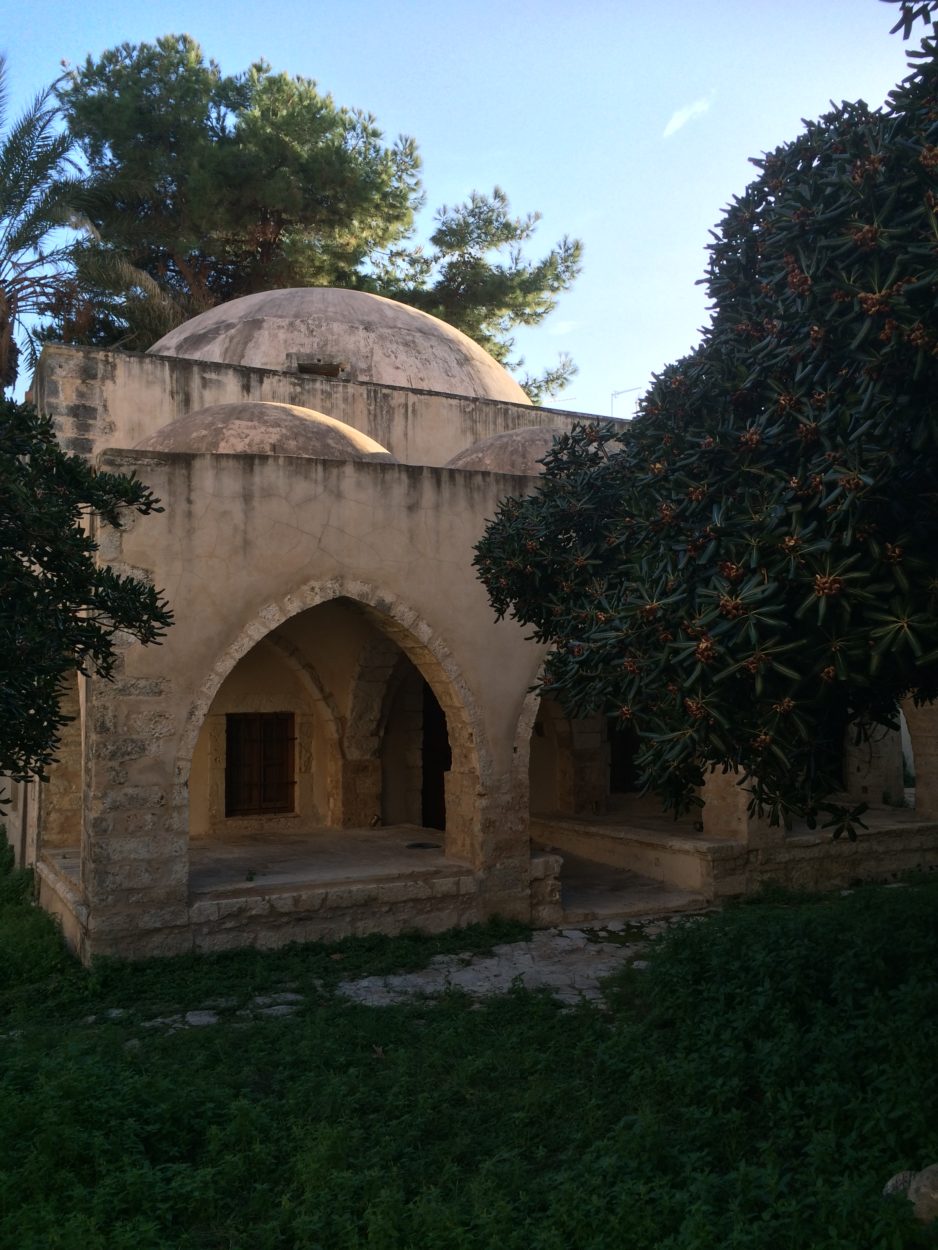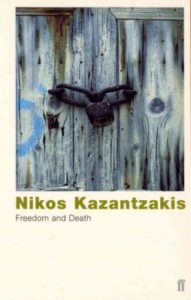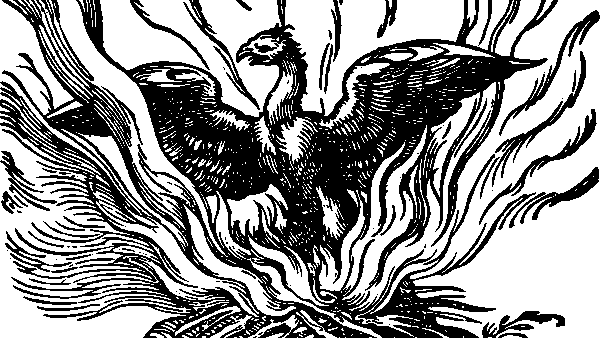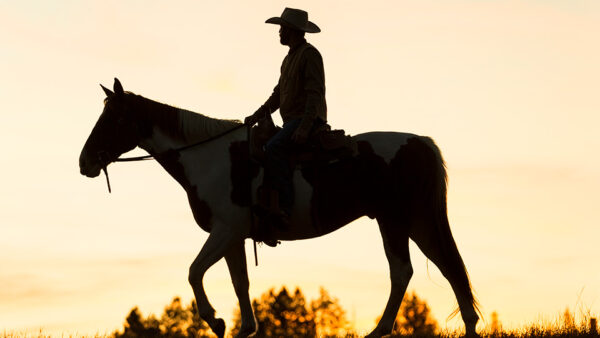“Captain Wildboar was his apt nickname in Megalokastro. With his sudden rages, his deep, dark, round eyes, his short, stubborn neck and that jutting fang, the heavy, broad-boned man was really like a wild boar, rearing for the spring.”
When Crete was fighting for its independence from the Ottoman Empire in the 19th century, “Freedom or death!” was a popular slogan among the fighters.
The alteration to “Freedom and Death” in the title of Nikos Kazantzakis’s novel is significant. This is not a tale of pure heroism, so it makes sense to have the slogan altered and somewhat complicated.
The “and” signals that this will not be a happy tale: the revolt will not end in pure freedom, and some of the main characters will die. But it also signals that their deaths will not be in vain because they will contribute to the cause of freedom.
(Incidentally, the US edition goes with the more heroic Freedom or Death for its title, while the Greek original is simply named after the main character, Captain Michales, and many translations follow that approach. In this case, I think the UK title is the most appropriate.)
One of the main strengths of Freedom and Death is that its central character, Captain Michales, is incredibly compelling. Here’s how he’s introduced on page 1:
“Captain Wildboar” was his apt nickname in Megalokastro. With his sudden rages, his deep, dark, round eyes, his short, stubborn neck and that jutting fang, the heavy, broad-boned man was really like a wild boar, rearing for the spring.
In no time at all, Captain Michales is rampaging through town (“Megalokastro” is the old name for modern-day Heraklion, the capital of Crete), inspiring fear in everyone he passes. Soon he is arguing with a powerful Turkish bey, then becoming blood brothers with him, then falling in love with his blood brother’s wife, then riding his horse into a Turkish coffee house and kicking out the customers, and finally heading up to the hills to join the escalating revolt against Ottoman rule.
Captain Michales is compelling but not entirely likeable. The qualities that make him a peerless resistance fighter and an inspirational leader of patriotic rebellions also make him a nightmare to have as a husband, father or friend. He rules by fear and intimidation, demands perfection from everyone around him and is quick to show his contempt when his friends or family don’t live up to his impossible standards. He is particularly contemptuous of anyone he sees as soft or weak or not manly enough, which includes writers, schoolmasters, and anyone who values brains over brawn.
The book’s introduction claims that the character is an “idealised” version of the author’s father, which makes me wonder what Nikos Kazantzakis’s childhood was like. He’s the kind of father who could certainly inspire you with his heroism and his morality and his leadership, but he could also crush the life out of you—especially if you want to be a writer instead of a resistance fighter.
Another thing that Freedom and Death does well is to describe the life of the Greek community in Turkish-dominated Heraklion. There’s a huge cast of characters here, from the head of the Greek Orthodox Church through to the shopkeepers and street vendors, and every single one of them is unique and memorable. Captain Michales is the hero and the focus, but he stands against a rich and utterly believable backdrop.
The Turks, however, are less well differentiated. A few stand out, like Nuri Bey, Captain Michales’s blood brother and frenemy, but mostly they are a mass, and some, like the war-hungry muezzin, verge on caricature.. The focus of the novel is on the Greek population, and although Kazantzakis rarely demonises individual Turkish characters, he rarely humanises them either.
What stops this from being a simple, patriotic tale of heroic Cretan freedom fighters is that Captain Michales is a deeply conflicted character. His growing love for and obsession with the Circassian wife of Nuri Bey comes to interfere with his fierce devotion to duty. When a crucial moment comes, and he must finally choose between love and duty, he chooses love. Then riddled with guilt and shame, his attempts to atone for this choice have severe consequences.
People sometimes draw a distinction between literary fiction, which is driven by character and strong themes, and genre fiction, which is driven by plot. Freedom and Death incorporates the best of both. It has strong, compelling characters and deeper themes of love, duty, national identity and so on, but it is also driven by a strong plot—especially in the second half, when the Cretan fighters take to the hills and events gather speed.
I lived in Crete a few years ago, and having read this book, I think I understand it better. I see the origins of the fierce independence, the pride, the attachment to traditions and to the land. Reading about Captain Michales made me remember a friend’s wedding at which a group of men from the bride’s father’s mountain village sat at their own table, separate from the modern city people, dressed all in black, with wild beards and wild eyes. The ones I spoke to were actually very nice, but at the same time they gave the impression that, like Captain Michales, they could very quickly switch to being not so nice if you got on the wrong side of them.
Freedom and Death also helps me to understand why Cretan pride is tempered by the memory of occupation, why national pride doesn’t seem to veer into contempt for outsiders—when I was living there, a far-right Golden Dawn candidate made an attempt to whip up anti-immigrant resentment in Chania and was promptly thrown into the sea by local residents.
I’d like to read more Kazantzakis books—maybe the famous ones, like Zorba the Greek and The Last Temptation of Christ. Have you read anything by Nikos Kazantzakis? Would you read this one? Let me know in the comments.





There are 4 comments
The book sounds really interesting. Why do publishers change titles when books get published in other countries? So annoying because it really can change the whole meaning and expectation of the book. I have not read Kazantzakis. Long ago I saw the movie of The Last Temptation of Christ, though I have zero recollection of it.
I love that the local residents of Chanis tossed the Golden Dawn candidate into the sea! There are a few candidates I’d like to toss into a big lake here! 😀
Yeah, people in Crete don’t mess around 🙂 For years afterwards, there was graffiti all over town of a swastika getting kicked into the sea.
The title changes can be very revealing. I love the way that the UK title alters the heroic “Freedom or death!” slogan and makes it much heavier and more poignant. I can see why they changed the original Greek version of “Captain Michales”, which doesn’t really say anything. But it does make it confusing, and I don’t get why the US version just goes with the straightforward slogan.
Yes, thrown into the sea: that stood out to me, as it did to Stefanie!
I’ve not read anything by Kazantzakis and had always thought of his as an important writer that I was only vaguely interested in, but the way you’ve described this particular story certainly makes it seem like a book I would appreciate reading!
I think the book meant more to me because Crete is so close to my heart, but I also think it would be fascinating for other readers. I haven’t read his more famous books like The Last Temptation of Christ and Zorba the Greek, but I plan to get to them soon.